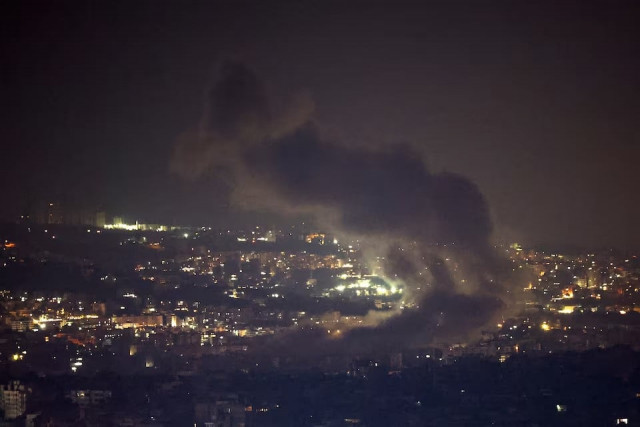Israel strikes Hezbollah intelligence headquarters in Beirut
Khamenei dismisses the move as ineffective; airstrikes caused widespread damage and intensified regional tensions

Israel conducted airstrikes on Hezbollah’s intelligence headquarters in Beirut, assessing the damage after targeting senior Hezbollah figures, a move Iran's Supreme Leader dismissed as ineffective.
The strikes followed an escalation prompted by Iran's missile attack on Israel, which was itself a response to Israeli military actions in Lebanon.
Oil prices surged due to fears of an Israeli attack on Iranian oil facilities. Israel is focusing on weakening Hezbollah in Lebanon and eliminating Hamas allies in Gaza.
The recent airstrikes targeted a potential successor to Hezbollah leader Sayyed Hassan Nasrallah, who was killed by Israel the previous week. The fate of Hashem Safieddine, a senior Hezbollah figure, remains unclear, and neither Israel nor Hezbollah has commented on the situation.
Witnesses reported explosions and smoke over Beirut’s southern suburbs early Saturday, as the Israeli military issued evacuation alerts for residents in the Burj Al-Barajneh, Choueifat, and Haret Hreik areas. Hezbollah claimed the Israeli army was attempting to infiltrate the southern Lebanese town of Odaisseh, resulting in ongoing clashes.
US President Joe Biden, when asked about Israel’s response to Iran, suggested alternatives to striking Iranian oil fields but noted Israel has not yet made a final decision. He denied speculation that Israeli Prime Minister Benjamin Netanyahu was attempting to influence the upcoming US. elections, stating that no administration has done more for Israel than his.
Lebanon reported over 2,000 deaths in the past year, most of which occurred in the past two weeks. The United Nations condemned the toll on civilians as “totally unacceptable.” Lebanon accused Israel of deliberately targeting civilians, highlighting the deaths of women and children. However, Israel maintained that it targets only military capabilities and accuses Hezbollah and Hamas of hiding among civilians, which both groups deny.
The US State Department confirmed the death of Kamel Ahmad Jawad, an American citizen from Dearborn, Michigan, in an Israeli airstrike on Tuesday. The department expressed concern and called on Israel to take precautions to minimize civilian harm.
The recent violence erupted after an October 7th attack by Hamas militants that killed 1,200 Israelis and resulted in around 250 hostages. Israel’s retaliation in Gaza has resulted in over 41,000 Palestinian deaths, according to Gaza’s health ministry, and has displaced nearly the entire population, triggering allegations of genocide, which Israel denies.
On Friday evening, around 70 projectiles were launched from Lebanon into Israeli territory, most of which were intercepted or landed in open areas. Israel’s ground operations in Lebanon, initially limited to border villages, have not specified the depth or duration of the incursions. Israel stated that its goal is to allow tens of thousands of its citizens to return home following Hezbollah's bombardments.
Iran’s missile attacks were partly in response to Israel’s assassination of Hezbollah’s secretary-general, Hassan Nasrallah. Iran’s Supreme Leader, Ayatollah Ali Khamenei, urged regional allies to strengthen their efforts against Israel, justifying Iran’s attacks as legitimate.
The semi-official Iranian news agency SNN reported that Israeli airstrikes targeted Hashem Safieddine, Nasrallah’s rumored successor, in an underground bunker, but his status is unclear. Israeli officials confirmed that the strikes targeted Hezbollah’s intelligence headquarters and killed Mohammad Rashid Sakafi, head of Hezbollah’s communication networks. However, there has been no comment from Hezbollah regarding the fate of Safieddine or Sakafi.
Khamenei stated that assassinations would provoke more attacks, calling on resistance groups to continue their fight. He also urged Afghanistan to join in the defense against Israel, framing the conflict as a service to the region and humanity.
The situation in Beirut is dire, with many buildings reduced to rubble, including Hezbollah’s stronghold in the southern suburbs. The Islamic Health Authority, a Hezbollah-linked civil defense group, reported 11 medics killed in separate Israeli attacks in southern Lebanon on Friday. The Israeli military confirmed strikes on several weapons storage facilities, command centers, and Hezbollah infrastructure in the Beirut area.
Iran’s Foreign Minister Abbas Araqchi, during a visit to Beirut, reiterated Tehran’s support for a ceasefire in Lebanon, contingent on Hezbollah’s approval and a simultaneous ceasefire in Gaza.



















COMMENTS
Comments are moderated and generally will be posted if they are on-topic and not abusive.
For more information, please see our Comments FAQ